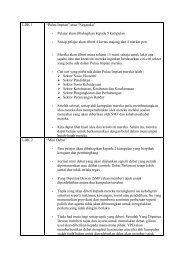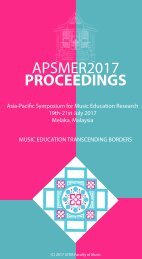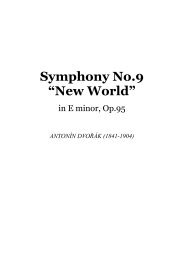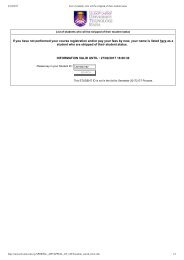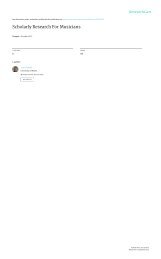APSMER2017 PROCEEDINGS
You also want an ePaper? Increase the reach of your titles
YUMPU automatically turns print PDFs into web optimized ePapers that Google loves.
Proceedings of the 11th Asia-Pacific Symposium for Music Education Research<br />
(APSMER 2017) 19th to 21st July 2017, Melaka MALAYSIA<br />
6. Parents’ Feedback<br />
• Having a good relationship with parents is extremely important.<br />
We value their input and their sincere comments, as this can<br />
help us train better teachers.<br />
Ongoing Training<br />
We believe that a teacher who stops learning should stop teaching. A teacher<br />
always need to be hungry for knowledge and willing to invest time in<br />
personal development (Harris 2006). A teacher never stops learning (Harris<br />
2012). Therefore, the learning and training will not stop after the initial 6 to 8<br />
months training.<br />
All student-teachers are obliged to attend an in-studio Holiday<br />
Teaching Training three times a year. In these sessions we discuss the<br />
challenges and obstacles they have faced over the term, and find solutions.<br />
Besides the practical challenges, we also discuss matters related to music<br />
analysis, preparing students for examinations and competitions, and methods<br />
for teaching in different areas e.g.: articulation, pedalling, phrasing, etc.<br />
Besides the in-studio training, we encourage student-teachers to enrol<br />
in other external teaching training courses like those organized by IRMTNZ:<br />
The Institute of Registered Music Teachers of New Zealand, which is a<br />
professional organization that provides regular professional development<br />
opportunities to private music teachers (www.irmt.org.nz). Master Classes,<br />
concerts, and workshops on teaching are run regularly throughout the year in<br />
different parts of New Zealand.<br />
Student-teachers are also encouraged to gain their Teaching Diploma<br />
from Trinity College London, Associated Board of Royal Schools of Music,<br />
or the Institute of Registered Music Teachers of New Zealand, when they<br />
reached the age of 18. After gaining their Teaching Diploma, they can then<br />
apply to be an Associate of The Institute of Registered Music Teachers of<br />
New Zealand (AIRMTNZ).<br />
The Outcome So Far<br />
From a humble beginning until now, we have had over 20 student-teachers<br />
go through the training process. Among those, seven have gained their<br />
Diploma of Teaching and have gone on to becoming an Associate of the<br />
Institute of Registered Music Teachers of New Zealand (AIRMTNZ), and are<br />
now working part time or full time as piano teachers around New Zealand.<br />
Most of the student-teachers did the training but did not proceed to gain a<br />
higher qualifications due to moving to other cities for tertiary education. This<br />
was particularly common after the major Canterbury earthquakes in<br />
2010/2011. Currently in my studio there are four student-teachers in training<br />
working part time, and two fully qualified teachers (they have gained their<br />
teaching diploma and registration).<br />
Conclusion<br />
Regardless what the student-teachers choose to do for their future<br />
professions, the two to three years teaching experience in their teenage years<br />
have had helped them immensely in facing adulthood in later years. From a<br />
teenager who might still be unable to make their own bed, he/she learns about<br />
time management, communication, analytical skills, and organization skills,<br />
11



